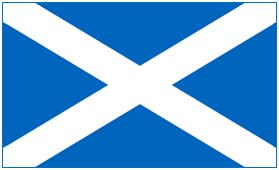On paper, should Scotland secede from the United Kingdom on September 18 via referendum, the political implications in British Parliament will be resoundingly in favor of the Conservative Party.
Tories would lose just 1 seat in Parliament, bringing their current total to 303 seats. Meanwhile the rival Labour Party would lose 41 seats, taking them down to 215. The overall Parliament would be less 59 seats, down to 591.
So, the Tories would have a clear majority in the 2015 elections, right?
Not so fast. Missing in this analysis is the meteoric rise of the UK Independence Party, led by the charismatic Nigel Farage. He is calling for British withdrawal from the European Union (EU), and the party has surged since 2010, when the European sovereign debt crisis began. That, coupled with high unemployment and the economy still sagging after the financial crisis, and the political establishment in London is having a hard time accounting for its own failures.
An April 23 campaign video by the party highlights excessive EU regulations on UK businesses, unfavorable trade agreements, lax immigration policies, European courts overruling British ones, and onerous green taxes on energy.
In a recent interview with the Daily Caller’s Ginni Thomas, Farage said that EU membership had been a mistake: “Never join a club whose laws become primary over yours and whose courts can overrule yours. Never listen to politicians who reassure you, ‘don’t worry, this is only a little club about trade.’”
As a result of that line, in May 2014’s European Parliament election in the UK, Farage’s party came in first place with more than 27 percent of the vote. David Cameron’s Conservatives came in a distant third with only 24 percent of the vote.
A similar outcome — with the UK Independence and Conservative parties splitting votes in the 2015 general elections — could favor Labour in the short term, regardless if Farage overpowers the Tories or not. After all, UK Prime Minister David Cameron of the Tories is not as popular as he was in 2010.
UPDATE: Although the seats would not technically be lost until 2016 when secession would formally occur, thereby necessitating another election, for the sake of argument let’s assume the following scenario:
Figure the UK Independents win enough seats to prevent the Tories from winning nationally in 2015, coming in third or fourth place. Labour might not have enough seats then, even combined with the Liberal Democrats — who would lose 11 seats to Scottish secession — to form a government.
Leaving just two possibilities. Either Labour would have to team up with the UK Independents to form a government, or they would have to team up with the Tories.
But Farage’s anti-European Union message is the antithesis of Labour. Moreover, nearly 40 percent of UK Independents favor not forming any coalition, according to TNS UK, speaking to a party that would become stronger in opposition. Farage would be tempted to take power, but might wisely pass up the opportunity.
Because, that would force Labour to deal with the Tories, who would be desperate to keep the UK Independents out of government. A similar outcome occurred in Greece after the 2012 elections, which resulted in the Socialist and Conservative parties forming a parliamentary coalition, just to keep the insurgent third party Syriza from taking power.
However, 30 percent of Tories favor a coalition with UK Independence. Teaming up with Labour would be the equivalent of political treason. That would only advance UK Independence’s cause. When the Labour-Conservative government failed to turn the economy around, that would be Farage’s moment to ascend, since it would prove his narrative that the two-party system is broken.
Of course, that’s all a long way off. Immediately, Scottish independence would be a game changer in Britain, the historical and political equivalent of an earthquake.
But even if Scotland’s bid for independence fails on Thursday, Farage will continue to be a force to be reckoned with versus the Tories in 2015. Stay tuned.
Robert Romano is the senior editor of Americans for Limited Government.







